综合英语第一册教案
- 格式:doc
- 大小:47.03 KB
- 文档页数:15
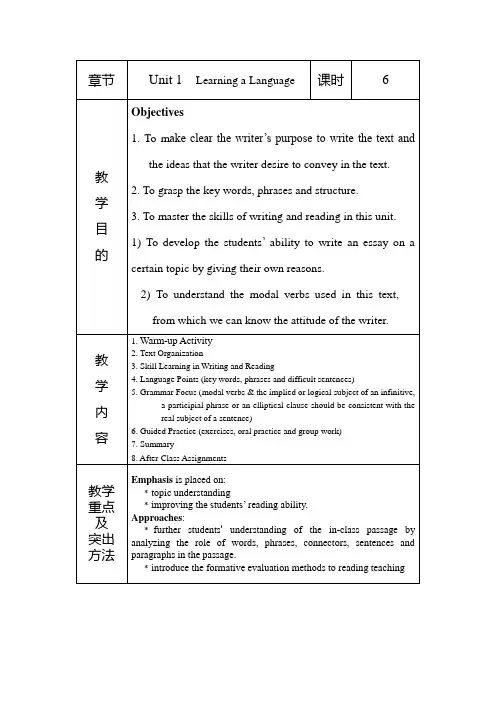
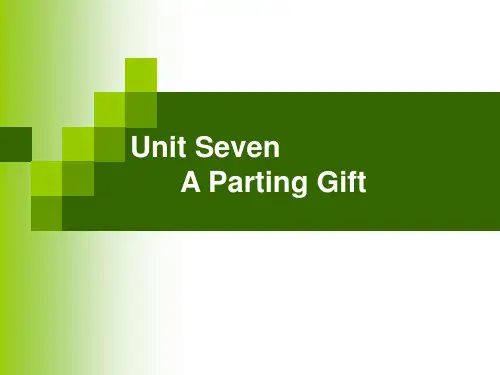
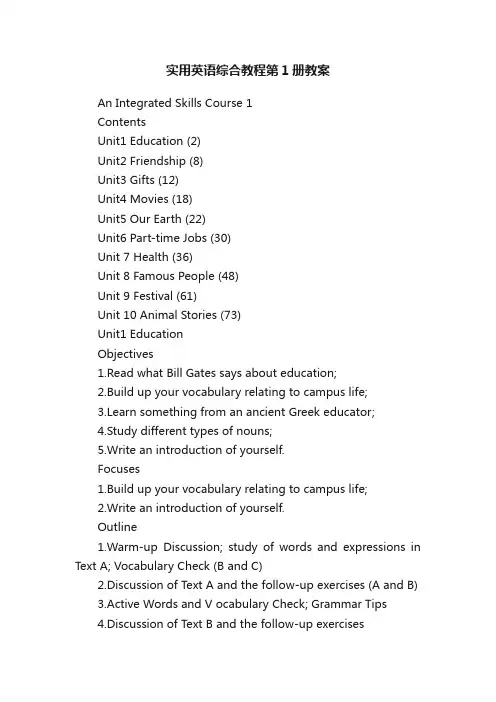
实用英语综合教程第1册教案An Integrated Skills Course 1ContentsUnit1 Education (2)Unit2 Friendship (8)Unit3 Gifts (12)Unit4 Movies (18)Unit5 Our Earth (22)Unit6 Part-time Jobs (30)Unit 7 Health (36)Unit 8 Famous People (48)Unit 9 Festival (61)Unit 10 Animal Stories (73)Unit1 EducationObjectives1.Read what Bill Gates says about education;2.Build up your vocabulary relating to campus life;3.Learn something from an ancient Greek educator;4.Study different types of nouns;5.Write an introduction of yourself.Focuses1.Build up your vocabulary relating to campus life;2.Write an introduction of yourself.Outline1.Warm-up Discussion; study of words and expressions in Text A; Vocabulary Check (B and C)2.Discussion of Text A and the follow-up exercises (A and B)3.Active Words and V ocabulary Check; Grammar Tips4.Discussion of Text B and the follow-up exercises/doc/5040d052e87101f69e31955e.html prehensive Exercises (Ask the students to do the translation exercises outside of theclass beforehand)6.Practical WritingProcedures:Classroom ActivitiesI. Warm-up discussionQuestion: Do you know anything about Bill Gates such as his life and his educational background?Hint1)birthday and birthplace: October 28, 1995; Seattle, Washington2)educational background: Harvard University (education not completed)3)career: chairmen and chief software architect of Microsoft, the word‘s largest and most profitable software company.4)main events in his life:a.beginning programming computers at age 13;b.developing a version of the programming language BASIC for the first microcomputer in Harvard;c.founding Microsoft Corporation in 1975 at the age of 19II. Vocabulary in Text A1. education n.教育e.g. Children in poor areas receive free education.educate v.教育;教导educated adj.受教育的e.g. a well-educated maneducator n.教育家,教育者2. count v.派用场,点数e.g. 1) Every seconds counts.2) What counts more is whether you have tried your best.3) to count from 1 to 1004) Count these apples.3. advantage n.有利条件,好处;优点,优势e.g. This product has many advantages.advantageous adj.有利的,有益的,便利的e.g. It is highly advantageous to us.Phrase: take advantage of 很好的使用;利用e.g. take advantage of all educational opportunitiesAntonym: disadvantage n.不利;不利条件e.g. His bad health is a great disadvantage to him when he looks for work.4. lifetime n.一生,终生e.g. 1) a lifetime guarantee2)lifetime membership3) In my father‘s lifetime there have been many changes in the village.5. part-time adj.& adv.兼职的(地)e.g. 1)a part-time job2)He works part-time.full-time adj.全职的e.g. a full-time housewife6. programmer n.程序师,编程员program v.编制程序e.g. Please program the computer to do the job instead of doing it manually(手工操作).7. discourage vt. 不鼓励;使泄气,使失去信心e.g. His parents discouraged him from joining the air force.discouraged adj. 泄气的,失去信心的discouraging adj.使人泄气的,使人失去信心的e.g. 1) If you meet difficulty in your study, don‘t be discouraged.2) It is discouraging that I didn‘t k now how to solve the problem.Antonym: encourage vt.鼓励e.g. I encouraged her to work hard and to try to pass the examinations.courage n. 勇敢,勇气e.g. David showed great courage when he saved the child from the burning house.8. diploma n. 文凭,毕业证书e.g. a college diplomadiplomatic adj. 外交的,从事外交的e.g. Julia joined the diplomatic service after her graduation from university.9. project n.项目,课题e.g. 1) an impossible project2) The professor is directing a research project.Synonym: plan10. highly adv. 高度地;非常e.g. 1) a highly interesting story2) a highly paid jobPhrase: speak/ think highly of 赞扬,对…给予很高评价e.g. The leader speaks / thinks highly of our work.11. focus v.(使)集中;(使)聚焦e.g. 1) to focus (one‘s mind) in work2) All eyes focused on the speaker.focus n.(兴趣活动等的)中心,焦点e.g. Because of his strange clothes, he immediately becamethe focus of attention when heentered the office.12. range n. 范围e.g. You have a wide range of choices.range vi.在某范围内变化e.g. The temperature ranges from 10 to 20 degrees.13. attend v.参加,出席e.g. attend schoolattend a lectureattendance n.出席,到场14. automatically adv.自动地e.g. the machine operates automatically.automatic adj.自动的e.g. We have an automatic washing machine.15. drop out of 退学,不参与,退出e.g. 1) He dropped out of school at the age of 10 because his family was too poor to afford thetuition.2) She decided to drop out of the competition because it was not fire.16. chance of a lifetime 千载难逢的良机,一生中唯一的机会e.g. It‘s the chance of a lifetime. You will regret it the rest of your lif e if you don‘t take it.17. try out 试验,考验e.g. She bought a cookbook and tried out a few new recipes.18. in short 简而言之,总之e.g. In short, you should study hard for a better future.Synonym: in brief/ to sum up/ all in all/ in conclusionIII. Language Points in Text A1.They want to know what to study, or whether it?s Ok todrop out of college since that?s what I did.what to study: This is a wh-word + infinitive structure used as the object, which can be changed into an object clause. Wh-word + infinitive structure can be used as a subject, an object, or an appositive clause(同位语从句),for example:1)How to improve their English is often discussed among the students.2)We haven‘t decided when to visit the place.3)You haven‘t answered my question about wher e to get these books.it?s Ok to drop out of college: Here ―it‖ is used as a formal subject, and the actual subject is the infinitive structure ―to drop out of college‖. The general pattern is ―It is + adj. + (for/ of + sb.) todo sth.‖ More examples:1)It was very thoughtful of her to come to see me when I was ill.2)It‘s easy for me to see through his trick.that?s what I did: ―what I did‖ here is a predictive clause (表语从句)introduced by ―what‖. It is always structured in the form of ―subject + be/ look/ remain/ seem + predictive clause‖ and can be introduced by such words as ―that‖ (always omitted), and other wh-words, for example:1) It seems (that) it is going to rain.2) This is why I refused to attend the meeting.2. As I?ve said before, nobody should drop out of college unless they believe they face the chance of a lifetime.As I?ve said before: This is a non-restrictive relative clause(非限制性关系从句) introduced by ―as‖(正如…的那样), which can be placed at the beginning or at the end of the sentence. Moreexamples:1) As people expected, she was admitted to Beijing University.2) Hundreds of people were killed in the earthquake, as I have learned from the newspaper. unless: is a conjunction for an adverbial clause of condition (条件状语从句), which equals ―if…not…‖(除非).e.g. I won‘t leave unless the rain stops.3. In my company?s early years, we have a bright part-time programmer who planned to drop out of high school to work.planned to: intend to do sth.计划、打算做某事e.g. I plan to make a trip to Beijing during the summer vocation.who planned to …work: a restrictive relative clause introduced by ―who‖ since its antecedent is a person and serves as the subject in the clause. The relative pronoun ―that‖ can be used here too. More examples:1) The young man who sits there quietly is my brother.2) I don‘t like people that pry into others‘ private business.4. Having a diploma certainly helps somebody who is looking to us for a job.look to sb./ sth.: to depend on sb. or sth. for help or advice 指望,依赖e.g. We look to you for support.5. High school and college offer you the best chance to learn many things and to do projects with others that teach you about team spirit.that teach you about team spirit: This is a restrictive relative clause introduced by ―that‖, whose antecede nt acts as the subject of the clause. Actually the relative clause introduced by ―that‖ can be used to modify both the person or the thing,and the roll of ―that‖ can be either the subject or the object.e.g. He was the only one that I knew there.I haven‘t been to the place that you have mentioned.6. In high school there was a time when I was highly focused on writing software, but for most of my high school years I had many interests.when …software: This is a relative clause introduced by the relative a dverb ―when‖, which acts as the adverbial of time in the clause.e.g. 1) There was a time when I completely lost my self-confidence.2) I will never forget those days when we were together.7. For me, classroom is not the only place where you can learn.where you can learn: This is a restrictive relative clause introduced by the relative adverb ―where‖, which is used as the adverbial of place in the clause.e.g. 1) Do you still remember the restaurant where we had dinner last night?2) This is the place where he stayed his whole life.8. In short, it?s a real mistake not to take the chance to studya wide range of subjects and to learn to work with other people because education does count.it?s a real mistake not to take the chance: This is an example of a negative infinitive structure, where ―not‖ is placed before an infinitive.e.g. 1) We are asked not to speak loudly in class.2) It is a good idea not to go out on such a rainy day.IV. Focus on Grammar名词(Noun )一、名词的概念表示人、事物或抽象概念的词叫做名词。
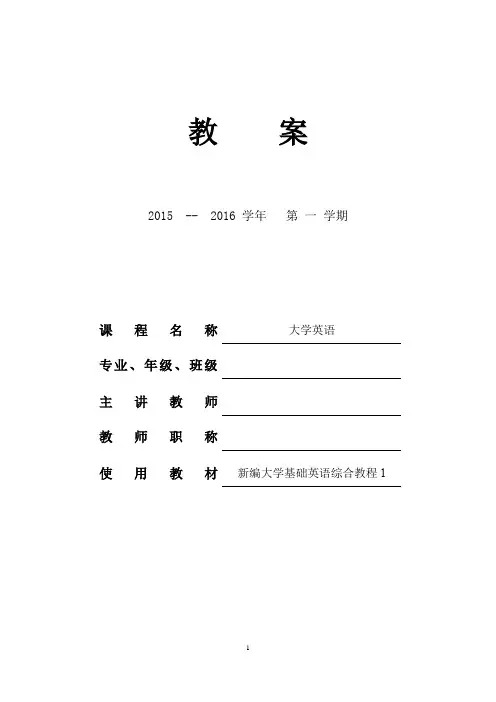

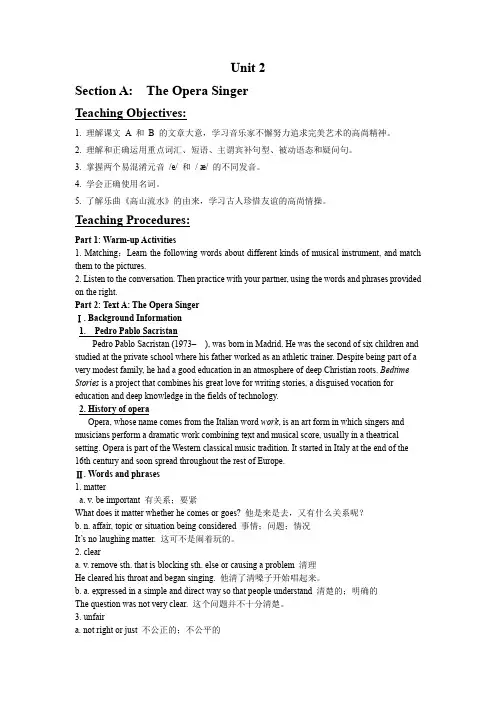
Unit 2Section A: The Opera SingerTeaching Objectives:1. 理解课文A 和B 的文章大意,学习音乐家不懈努力追求完美艺术的高尚精神。
2. 理解和正确运用重点词汇、短语、主谓宾补句型、被动语态和疑问句。
3. 掌握两个易混淆元音/e/ 和/ æ/ 的不同发音。
4. 学会正确使用名词。
5. 了解乐曲《高山流水》的由来,学习古人珍惜友谊的高尚情操。
Teaching Procedures:Part 1: Warm-up Activities1. Matching:Learn the following words about different kinds of musical instrument, and match them to the pictures.2. Listen to the conversation. Then practice with your partner, using the words and phrases provided on the right.Part 2: Text A: The Opera SingerⅠ. Background Information1. Pedro Pablo SacristanPedro Pablo Sacristan (1973– ), was born in Madrid. He was the second of six children and studied at the private school where his father worked as an athletic trainer. Despite being part of a very modest family, he had a good education in an atmosphere of deep Christian roots. Bedtime Stories is a project that combines his great love for writing stories, a disguised vocation for education and deep knowledge in the fields of technology.2. History of operaOpera, whose name comes from the Italian word work, is an art form in which singers and musicians perform a dramatic work combining text and musical score, usually in a theatrical setting. Opera is part of the Western classical music tradition. It started in Italy at the end of the 16th century and soon spread throughout the rest of Europe.Ⅱ. Words and phrases1. mattera. v. be important 有关系;要紧What does it matter whether he comes or goes? 他是来是去,又有什么关系呢?b. n. affair, topic or situation being considered 事情;问题;情况It’s no laughing matter. 这可不是闹着玩的。
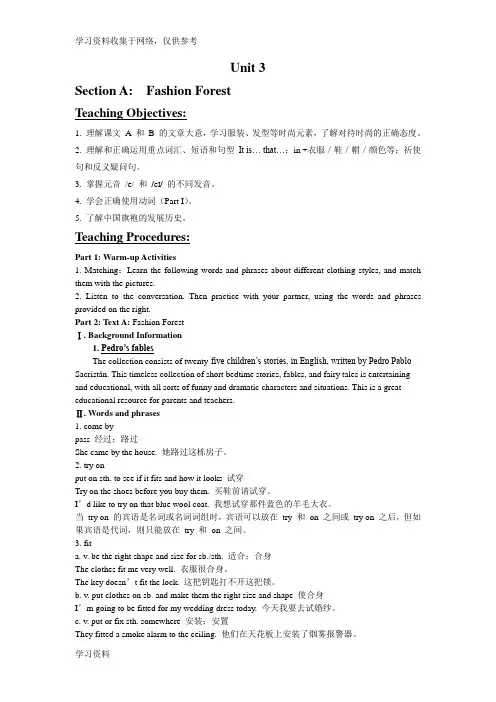
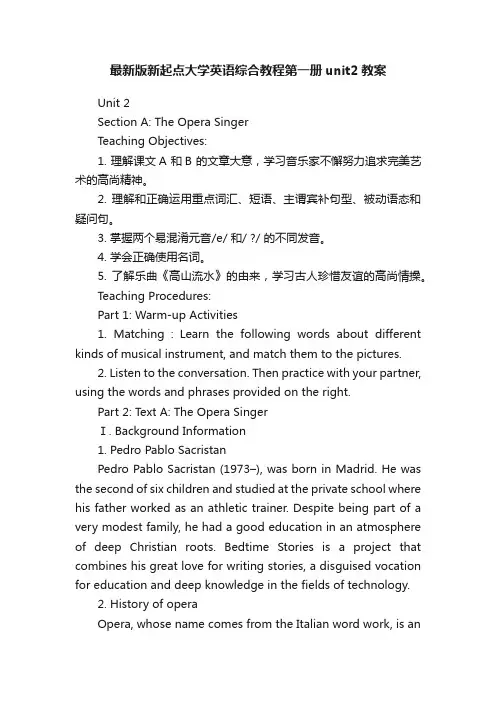
最新版新起点大学英语综合教程第一册unit2教案Unit 2Section A: The Opera SingerTeaching Objectives:1. 理解课文A 和B 的文章大意,学习音乐家不懈努力追求完美艺术的高尚精神。
2. 理解和正确运用重点词汇、短语、主谓宾补句型、被动语态和疑问句。
3. 掌握两个易混淆元音/e/ 和/ ?/ 的不同发音。
4. 学会正确使用名词。
5. 了解乐曲《高山流水》的由来,学习古人珍惜友谊的高尚情操。
Teaching Procedures:Part 1: Warm-up Activities1. Matching:Learn the following words about different kinds of musical instrument, and match them to the pictures.2. Listen to the conversation. Then practice with your partner, using the words and phrases provided on the right.Part 2: Text A: The Opera SingerⅠ. Background Information1. Pedro Pablo SacristanPedro Pablo Sacristan (1973–), was born in Madrid. He was the second of six children and studied at the private school where his father worked as an athletic trainer. Despite being part of a very modest family, he had a good education in an atmosphere of deep Christian roots. Bedtime Stories is a project that combines his great love for writing stories, a disguised vocation for education and deep knowledge in the fields of technology.2. History of operaOpera, whose name comes from the Italian word work, is anart form in which singers and musicians perform a dramatic work combining text and musical score, usually in a theatrical setting. Opera is part of the Western classical music tradition. It started in Italy at the end of the 16th century and soon spread throughout the rest of Europe.Ⅱ. Words and phrases1. mattera. v. be important 有关系;要紧What does it matter whether he comes or goes? 他是来是去,又有什么关系呢?b. n. affair, topic or situation being considered 事情;问题;情况It’s no laughing matter. 这可不是闹着玩的。
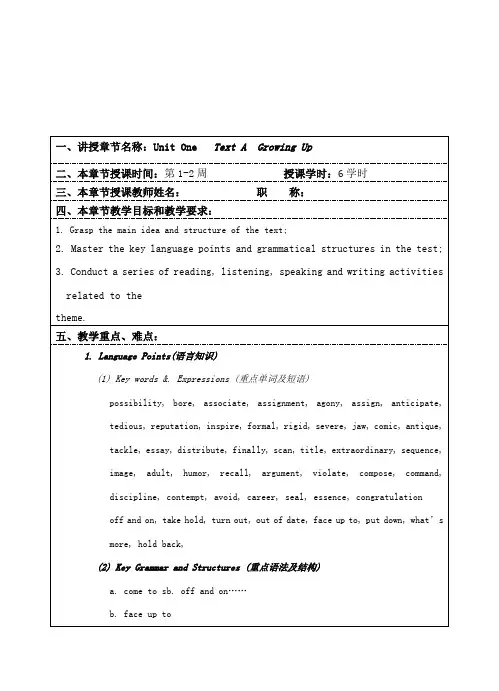
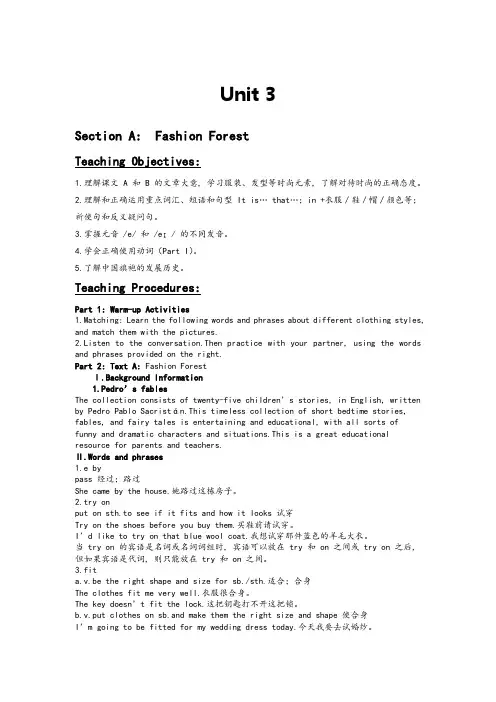
Unit 3Section A: Fashion ForestTeaching Objectives:1.理解课文 A 和 B 的文章大意, 学习服装、发型等时尚元素, 了解对待时尚的正确态度。
2.理解和正确运用重点词汇、短语和句型 It is… that…;in +衣服/鞋/帽/颜色等;祈使句和反义疑问句。
3.掌握元音 /e/ 和 /eɪ/ 的不同发音。
4.学会正确使用动词(Part I)。
5.了解中国旗袍的发展历史。
Teaching Procedures:Part 1: Warm-up Activities1.Matching: Learn the following words and phrases about different clothing styles, and match them with the pictures.2.Listen to the conversation.Then practice with your partner, using the words and phrases provided on the right.Part 2: Text A: Fashion ForestⅠ.Background Information1.Pedro’s fablesThe collection consists of twenty-five children’s stories, in English, written by Pedro Pablo Sacristán.This timeless collection of short bedtime stories, fables, and fairy tales is entertaining and educational, with all sorts offunny and dramatic characters and situations.This is a great educational resource for parents and teachers.Ⅱ.Words and phrases1.e bypass 经过;路过She came by the house.她路过这栋房子。
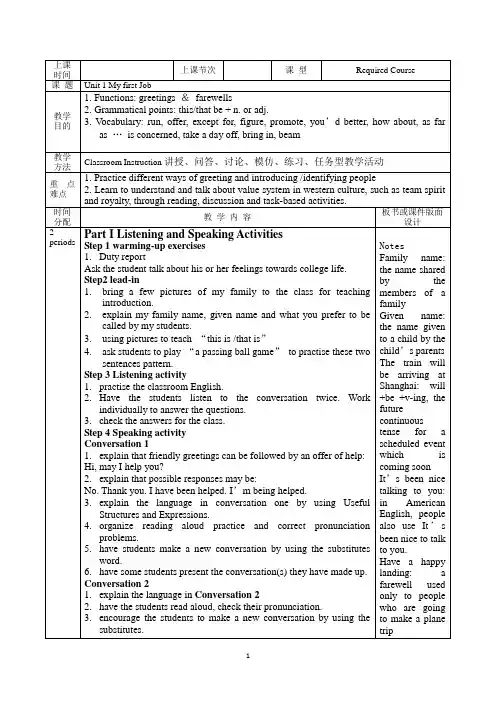
Unit 3Section A: Fashion ForestTeaching Objectives:1. 理解课文A 和B 的文章大意,学习服装、发型等时尚元素,了解对待时尚的正确态度。
2. 理解和正确运用重点词汇、短语和句型It is… that…;in +衣服/鞋/帽/颜色等;祈使句和反义疑问句。
3. 掌握元音/e/ 和/eɪ/的不同发音。
4. 学会正确使用动词(Part I)。
5. 了解中国旗袍的发展历史。
Teaching Procedures:Part 1: Warm-up Activities1. Matching:Learn the following words and phrases about different clothing styles, and match them with the pictures.2. Listen to the conversation. Then practice with your partner, using the words and phrases provided on the right.Part 2: Text A: Fashion ForestⅠ. Background Information1. Pedro’s fablesThe collection consists of twenty-five children’s stories, in English, written by Pedro Pablo Sacristán. This timeless collection of short bedtime stories, fables, and fairy tales is entertaining and educational, with all sorts of funny and dramatic characters and situations. This is a great educational resource for parents and teachers.Ⅱ. Words and phrases1. come bypass 经过;路过She came by the house. 她路过这栋房子。
Unit1 College lifePeriod: 2Teaching Content: Unit1 College life (1)Listening and Speaking ,Reading Text AAims of Teaching1. To improve the listening and speaking abilities of Ss’2. To improve Ss’ reading ability.Main points in teaching1. Understand the main ideas of Text A and master the useful sentence structures, words and expressions.2. Develop ss’ basic language skills by listening and speaking.Difficult points in teachingUnderstanding of some difficult sentencesTeaching procedures:The first periodStep1 Lead-in1.This is the first class of the new semester. I haven’t met my students before, so it is the first time that we’ve met each other. First, I’ll break the ice by introducing myself to the students. Then, I’ll ask them what kind of college life they hope for? What’s their impression on the college? What are they going to do after graduation? hoping that they can learn a lot and practice what they have learned into practice so that they can lay a very good foundation for their future professional careers, and they can enjoy their college life.2.Some requirements for ss1) Each student will be required to make a report at the beginning of class2) All students are divided into 10 learning groups, with 4 students a group and a group reader will be chosen by themselves3. Tips on how to learn English well at collegeStep2 Listening1. Activity 1 Sound Recognition2. Activity 2 Conversation3. Activity 3 PassageQuestions and Answers1. Q: What is the weather like in Britain?A: It is cool in summer and warm in winter.2. Q: When do the winds bring cool air to Britain?A: In summer.3. Q: Why isn’t there much difference between the summer and winter weather?A: Because the winds from the west blow Britain all the year.4. Q: In which part of Britain is there less rain?A: In the east.5. Q: What is the passage mainly talk about?A: The weather in Britain.Step3 SpeakingThis activity mainly focuses on going over some useful expressions, and how to use them in a real dialog1. Activity 1A: Good morning, Wang Xiaoping.B: Good morning, Huang Linwei.A: How are you this week?B: Just fine. Thank you. And you?A: I’m fine, too. Thank you.A: Hello, Jane.B: Hello, David.A: How are you doing these days?B: Fine, thanks. How about you?A: I’m fine, too. Thank you.B: Is Grace well now?A: She is very well. She is now in China.B: That’s good.The second periodStep4: DiscussionWhat kind of college students do you expect to be?S1:Before I entered the college, I had a dream that I could become the top student in my class. When I woke up, I was determined that I should try my best to make my dream come true. So now I study very hard, and I am sure that my dream will come true some day.S2:After I came to the college, I think that I should develop myself in every field. First, I should study well, and then I should take most of the students’ activities if I am free. I hope that I can become the chairman of the students’ union of our college, because I can have more chances for practice. In that way, I can learn much more.S3:I hope that I can study well at college. For example, I can read a lot of books, learn a lot from my teachers and classmates, pass every examination and become one of the top students in my class.S4:I hope that I can fully develop myself. First, I can learn as much as I can and pass all the examinations easily. Then, I can make a lot of friends on and off campus so that I can easily get a job after my graduation.Step 5: Fast reading1 Ask ss to read Text A as fast as they can and get the general idea of the passage. Then finish the “reading comprehension” on p82. Close books and concentrate on the recording of Text A3. Read the text aloudStep6 Homework1. Recite the new words on Text A and understand Text A2. Finish off Exs on p10-13。
New College English (Second Edition) Integrated Course 1 全新版大学英语(第二版)综合教程第1册Unit 1 Growing UpText A Writing for MyselfI。
Teaching ObjectivesStudents will be able to:1。
grasp the main idea (the essence of writing is to write what one enjoys writing)and structure of Text A (narration in chronological sequence);2. appreciate the narrative skills demonstrated in Text A (selection of details,repetition, coherence);3。
master the key language points and learn how to use them in context;4。
understand the cultural background related to the content;5. express themselves more freely on the theme of Growing Up after doing a series of theme—related reading,listening, speaking and writing activities;6. write a letter of congratulations in an appropriate way.II。
Teaching Focus1。
Talk with the students about the different ways of learning English in the middle school and college;2。
Unit 1Section A: Your First Night at SchoolTeaching Objectives:1. 理解课文A 和B 的文章大意,了解大学新生的心态和入校后的事宜。
2. 理解和正确运用重点词汇、短语和句型(真实条件句、否定句、疑问句)等。
3. 掌握长元音/i:/ 和短元音/I/ 的不同发音。
4. 学会正确使用不同的词性。
5. 了解对中国文化影响深远的儒家代表人物孔子及其思想。
Teaching Procedures:Part 1: Warm-up Activities1.Matching:Learn the following words and phrases about different places on campus, and match them to thepictures.2.Listen to the conversation. Then practice with your partner, using the words and phrases provided on the right.3.Background Information1. SATWith the idea of providing colleges and universities with one common criterion that can be used to compare all applicants, the College Board has created SAT, which is an entrance exam used by most colleges and universities in the United States to make admissions decisions. There are three sections: Math, Critical Reading and Writing.2. NCAAThe National Collegiate Athletic Association (NCAA) is a non-profit association which regulates athletes of about 1,300 institutions. It also organizes the athletic programs of many colleges and universities in the United States and Canada, and helps more than 450,000 college student-athletes who compete annually in college sports. The organization is headquartered in Indianapolis, Indiana.Part 2: Text A: Your First Night at SchoolⅠ. Words and phrases1. survivev. continue to live normally and not be too upset by your problems 艰难度过I don’t think I could survive another year as a teacher; it’s just too stressful.我认为我没法再多做一年老师;这压力太大了。
Unit 4Section A: A Dance with DadTeaching Objectives:1. 理解课文理解课文A 和B 的文章大意,了解人们如何通过舞蹈或对舞蹈艺术的追求来抒发对父母的感激之情。
母的感激之情。
2. 理解和正确运用重点词汇、短语、句型理解和正确运用重点词汇、短语、句型 S+V+O 和 if 条件句等。
条件句等。
3. 掌握中元音掌握中元音 /Ã/ 和后元音和后元音 /A:/ 的不同发音。
的不同发音。
4. 正确区分现在分词和过去分词。
正确区分现在分词和过去分词。
5. 了解中国传统“舞龙”的历史及象征意义。
的历史及象征意义。
Teaching Procedures:Part 1: Warm-up Activities1. Matching :Learn the following words and phrases about different types of dance, and match them to the pictures.2. Conversation: Listen to the conversation. Then practice with your partner, using the words and phrases provided on the right.Part 2: Text A: Fashion ForestⅠ. Background Information1. Beer Barrel Polka“Beer Barrel Polka”, also known as “The Barrel Polka and Roll Out the Barrel”, is a song which became popular worldwide during World War II. The music was composed by the Czech musician Jaromír Vejvoda in 1927. In June 1939, “Beer Barrel Polka”, as recorded by Will Glahé, was on the Hit Parade. During World War II, versions in many other languages were created and the song was popular among soldiers, regardless of their allegiances.Ⅱ. Words and phrases1. dancea. v. move rhythmically in a series of steps 跳舞跳舞I danced with her all night. 我整晚都跟她共舞。
牡丹江师范学院教案教研室:教师姓名:授课时间:第周教研室主任签字年月日1Unit 8 My Forever Valentine (Period one)【Learning Objectives】:1.Read the words and expressions in this unit. Pay attention to the correct pronunciation.2.Find out the sentences with new words and expressions. Try to understand the meaning of thesesentences.3.Understand the type of writing and the structure of this passage.4.Get the general information of the whole passage.【Preparation before class】1.Read the words and expressions in this unit and write down the ones that you don't know how toread correctly.2. read the text 3 times before the class.【Classroom activities】1.Listening and speaking(1)Dictation:2(2). FatherThe father is often seen as an authority figure. A common observation among scholars is that theauthority of the father and of the political leader are closely intertwined, that there is a symbolicidentification between domestic authority and national political leadership.The fundamental commongrounds between domestic and national authority, are the mechanisms of naming (exercise theauthority in someone's name) and identification. In a patriarchal society, authority typically uses suchrhetoric of fatherhood and family to i mplement their rule and advocate its legitimacy. In Western culture patriarchy and authority have been synonymous. In the 19th century Europe,the idea was common, among both traditionalist and revolutionaries, that the authority of the domesticfather should e made omnipotent in the family so that it becomes less necessary in the state. In thesecond part of that century, there was an extension of the authority of the husband over his wife andthe authority of the father over his children, including increased demands for absolute obedience ofchildren to the father.2.Preparation sharingWork in groups. Exchange the difficulties that you meet when preparing for this class.Try to solvesome of them with the help of your group members. Read the new words and expressions in Unit 63.The understanding of the whole text.※Read the text※1). Main idea①What is the story narrated in the text about?The text recollects a series of events concerning, who showed profound forhis daughter by on Valentine's Day.②Why does the writer focus her accounts and descriptions on her first recollection of the magicher father brought to the occasion and on the last card and gift from him? Because the first and last gifts her father offered her areand .2). Structural analysis②The author's recounting of her Valentine Day memories in the second part of the text followsclosely the chronological order. Try to pick out the three sentences in this part that indicate theprogression of time.The three sentences that indicate the progression of time are:1) (Paragraph 3)2) (Paragraph 5)3) (Paragraph 7)34. Feedback(1)Finish the exercises of text comprehension on page 145(2)Do you still have any problems about the general idea of this passage. Write them down here.Unit 8 My Forever Valentine (Period two/three)【Learning objectives】:1.Get the detailed information of the whole passage.2.Grasp the use of some key words and expressions in this unit.3.Be able to analyze and understand some long and difficult sentences in the passage. 【Preparation before class】1.Key words and expressions:learn the words and expressions by finishing the vocabulary learningtable with the help of your dictionary.2.Read the passage carefully and mark some difficult sentences that you don't understand.【Classroom activities】1.Preparation sharingWork in groups. Exchange the difficulties that you meet when preparing for this class. Try tosolve some of them with the help of your group members.2.Detailed readingParagraphs 1-2Questions1) What was the narrator's father? And what was his hobby? (Paragraph 2)2) Why did the narrator think of her father as her Valentine Man? (Paragraph 2)4Sentences:The traditional holidays in our house when I was a child were spent timing elaborate mealsaround football games. ( Paragraph 1)Explanation: Some of the traditional holidays in the United States are Valentine's Day (February 14);St. Patrick' Day (March 17); and Halloween (October 31). In some states, Arbor Day, Bird Day, andFlag Day are school holidays. Child Health Day (the first Monday in October) is widely observed inschools. Many schools and some businesses close on Good Friday.Translation:Paragraphs 3-6Questions1) What does “the magic”mentioned in Paragraph 3 refer to? (Paragraph 3)2) What gifts did the narrator's father give her as she grew older? (Paragraph 5)56Sentences:Sentences1. That box and its contents ushered in a succession of bittersweet memories of my entrance intoa world of popularity contests marked by the number of cards received, the teasing aboutboyfriends/girlfriends and the tender care I gave to the card from the cutest boy inclass.(Paragraph 3)Translation:2. As I grew older, the gifts gave way to heart-shaped boxes filled with my favorite chocolatesand always included a special card signed”Love, Dad. ”(Paragraph 5) Explanation: The affectionate message might be carried by a heart-shaped box of chocolate candies,or by a bouquet of tulips tied with filmy red ribbon.Translation:3. He never let it show. (Paragraph 6)Paraphrase: He never revealed his feelings.Activity: Making sentencesDirections: use the following words and expressions to make sentences. elaboratefondlycuterecollectionsuccessionsurpassgive wayParagraphs 7-10Questions1) Why was the job of hand-delivering candy and cards relegated to the U.S. Postal Service?(Paragraph 7)72) How did the writer describe the final card she received from her dying father? (Paragraphs 8-10)8Sentences1. Never in ten years was my father's package late nor was it on the Valentine's Day eight years agowhen I reached into the mailbox to find a card addressed to me in my mother's handwriting.(Paragraph7)Translation:2. It was the kind of card that put a lump in your throat and teas in your eyes because you knewthe person no longer was to go out and buy a real valentine.(Paragraph 9)Translation:Paragraphs 11-12Questions1) Why does her father's final card still remain on her bulletin board today? (Paragraph 11)2) Would you please paraphrase the concluding part? (Paragraphs 11-12)94. Feedback:Finish the exercises of text comprehension on page 146-156Consolidation ActivitiesI. Vocabulary AnalysisII. Grammar Exercisesreal and unreal conditionalsWith real conditionals, there is a chance that the condition will be fulfilled; with unreal conditionalthere is no such chance.e.g. If he arrives on time, he will be able to go with us. (Real condition)If he had arrived on time, he would have been able to go with us. (Unreal condition)If I were (was) you, I would be careful. (Unreal condition).1011。